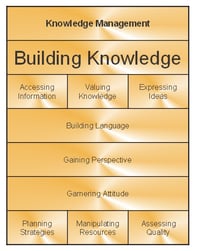Published on
Innovation Focus Should Be on Quality, Not Cost

The following interview is with Amy Slaton, a professor in the history and politics department at Drexel University. As innovation increases in the higher education space, particularly in teaching and learning, it’s important to consider the impact such innovation can have on students’ actual learning outcomes. Slaton recently shared her perspective on the importance of the traditional approach to education in an essay for Inside Higher Ed, and in this interview she expands on those ideas and discusses the danger in rooting postsecondary innovation in the demand for cost savings.
1. Why is there such a desire to innovate graduate education?
Let’s take a look at that word “innovate.” It’s hard to argue with the idea that innovation is good; that’s basically what the word means. But if we look at the way it’s being deployed right now, that word is getting used as an umbrella for cost saving: the idea that the way universities are approaching both undergraduate and graduate education is simply too costly and there need to be ways to fix this. Innovation becomes an umbrella term for possibly more efficient education, less wasteful — and I’m not sure that’s going to lead us to enriched education.
There is a world of fabulous, very progressive thinking in education that I would like to see embraced as part of that innovation — the notion of the level of reflexivity for both the faculty and students, notions of diversity — but I’m not sure that’s what people mean by “innovation.”
2. In your mind, what’s the ideal picture of innovation when it comes to graduate education?
What I’d love to see in graduate education is a lot more funding for graduate students so they don’t have to have full-time jobs while they’re going to school. I’d also like to see universities in general pursue more equitable salaries, more support for tenure lines; things that make the university stronger or makes the graduate experience more enriching, more durable, more equitable.
I’m very concerned with institutional health. I’d like to see institutions look to that rather than a market model that says, “The less expensive degree is the one that will serve us best.”
I just don’t think that’s true.
3. How will emerging models such as competency-based education impact graduate education?
I don’t think that the format of the technology itself is problematic and I’d be cautious about comparing them to so-called ‘traditional learning.’ Traditional learning is many things and I’m not sure we want to see an online experience as devoid of those critical, interactive sorts of experiences for students. What can happen when a new programming idea proceeds from the notion of saving [a] school money is that the ratio changes. There are fewer faculty providing those students [with] learning hours; students are able to get through with fewer hours in seats. Those kinds of changes which are coming to undergrads will also shift graduate education, and I worry about that.
The graduate experience is a lot like undergraduate; it needs to have a lot of open-ended experiences, a lot of uncertain moments where you don’t know if there is an answer to your question, where you don’t know if there is going to be an identifiable outcome to your research or to your thinking. That openness, that uncertainty, is pretty much antithetical to the ideas of efficient online or competency-based learning that we’re seeing now.
Let me be clear: I don’t think those technologies are inherently disadvantageous toward learning. I just think that when they proceed from the notion of minimizing cost, then what you see are experiences geared toward outcomes, toward metrics of competency that are really not in line, even, with technical education. That’s just not how creativity happens. That’s not how energy pervades a classroom either.
4. Is there anything you’d like to add about innovation in the graduate education space — where we’ve gone so far and how you’d like to see the future evolve in terms of these changes to graduate education?
I’m a historian of education; I’m not a policy person. I do want to push us to look deeper and wider than we generally look at higher education when we look at competency-based techniques or we look online or at MOOCs [Massive Open Online Courses] or other kinds of innovation.
We really need to imagine a world where universities see their role not as providing a wide product line, not as spinning into market conditions, but as really producing the great thinkers we’ve always generated in this country. Part of that demands really systemic reforms. If we’re talking about competency-based education as the answer and we’re not also looking at congressional appropriations for higher ed, we’re not looking at Pell grants, we’re not looking at wages for faculty and staff of the universities, then we’re not being very honest. These are very politicized choices and we can argue about them, but we need to own the politics, not pretend this is a technological fix for an extremely complex societal problem.
This interview has been edited for length.
Author Perspective: Educator



